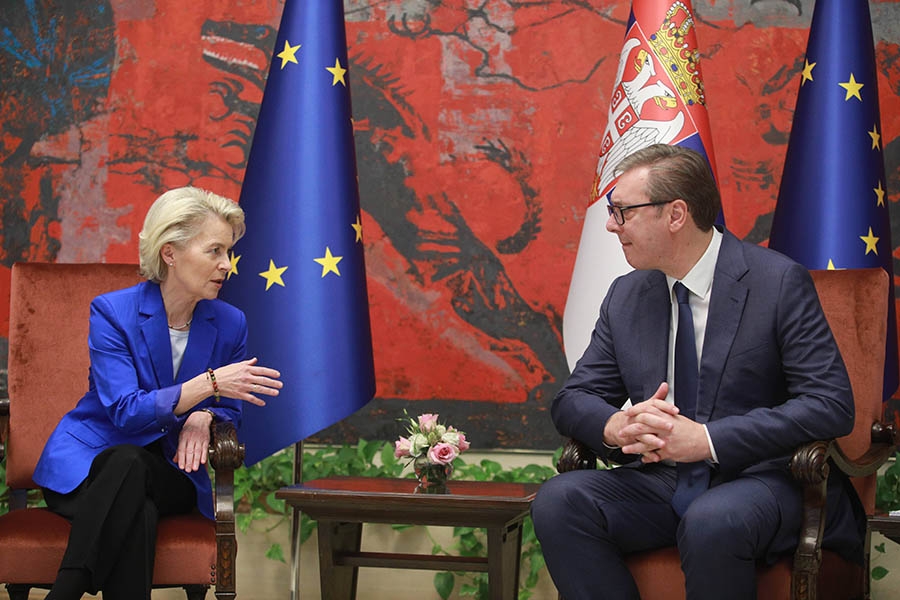Already, the Brussels agreement, signed in April 2013, was an acknowledgement of a “new reality” in Kosovo, since Serbia, among other things, agreed that Serb-majority municipalities in the North would be integrated into Kosovos judicial system
According to the interpretation of the connoisseurs of the occasion, the de facto recognition is a coin that the West intended primarily for Kosovo Prime Minister Albin Kurti

Already, the Brussels agreement, signed in April 2013, was an acknowledgement of a “new reality” in Kosovo, since Serbia, among other things, agreed that Serb-majority municipalities in the North would be integrated into Kosovos judicial system
According to the interpretation of the connoisseurs of the occasion, the de facto recognition is a coin that the West intended primarily for Kosovo Prime Minister Albin Kurti

The phrase “de facto recognition of Kosovo”, which is often mentioned in our public these days, is not a new fact, nor is it a sign that official Belgrade will give up its position that Kosovo is an integral part of Serbia. As sources from diplomatic circles explain to Demostat, already the Brussels agreement, signed in April 2013, was an acknowledgement of the “new reality” in Kosovo, since Serbia, among other things, agreed that Serb-majority municipalities in the North would be integrated into Kosovos judicial system. This was done with two guarantees: “all judicial matters are under Kosovo law, but Kosovo Serbs must be the majority of certain chambers; the chamber must sit in North Mitrovica; all police work should be done by the Kosovo police, but the Regional Police Commander in Serb-majority areas must be a Kosovo Serb elected from a list submitted by Kosovo Serb municipalities”.
According to the interpretation of the connoisseurs of the occasion, “de facto recognition” is a coin that the West primarily intended for Kosovo Prime Minister Albin Kurti, because in this way it will be easier for him to explain to the Kosovo’s Albanians that it is necessary to finally form the community of Serb Municipalities (which the Pristina authorities and the western “Five” call the “Association of Serb-majority municipalities”). As is well known, the ZSO was also agreed with the Brussels agreement (also known as the “First Brussels agreement”), which was signed a decade ago, mediated by Catherine Ashton, then head of EU diplomacy, by the then prime ministers in Belgrade and Pristina, Ivica Dacic and Hashim Thaci. In accordance with the competences conferred by the European Charter of local self-government and Kosovo law, participating municipalities shall have the right to cooperate in the collective implementation of their powers through the Community/Association. The association / community will have full control over the areas of economic development, education, health, urbanism and Rural Development. The Association / Community shall exercise other additional powers delegated to it by the central authorities. The Community/Association shall have a representative role towards the central authorities and to this end shall be represented in the Consultative Council of the community. In order to fulfill this role, a monitoring function is provided”.
Over the past ten years, Belgrade and Pristina have adopted a number of agreements within the EU-sponsored Brussels dialogue, including those on telecommunications and energy. As early as in June 2013 the two sides exchanged liaison officers. The telecommunications agreement allowed Kosovo to receive the area code (+383). In late June 2022 Belgrade and Pristina accepted the “roadmap for the implementation of energy agreements within the Brussels dialogue”.
The European Commission President Ursula von der Leyen, who is on a “Mini Balkan tour” this week, said in Pristina after talks with Kosovo President Vjosa Osmani that Kosovo should accept the formation of the ZSO, while Serbia should “de facto” recognize Kosovo.
"The steps we take forward will only be possible if Kosovo and Serbia normalize their relations. Of course, there are fields where both sides should be engaged to cooperate, and we also call on Kosovo to facilitate the process of accepting the ZSO, and Serbia must accept the de facto recognition of Kosovo, the EC President said.
Von Der Leyen, speaking to reporters in Belgrade at a joint conference with Serbian President Aleksandar Vucic, was not the first to mention the term “de facto recognition”, but explained in response to a journalists question that it actually means the implementation of the agreement reached in Ohrid.
- What is it about: the implementation of the Ohrid Agreement, which is envisaged by various steps, which include the recognition of Kosovo documents and institutions by Serbia, and which goes with the establishment of the ZSO, that should be implemented by Kosovo, she said, calling on the Serbs to support the European proposal of the ZSO statute, and Kosovo to implement it.
Vucic said that recognition of Kosovos independence is not an issue for Serbia, and that he is not ashamed to repeat it in front of the President of the European Commission. He pointed out that “Serbia is committed to preserving peace and stability, we know our obligations, but also that it is clear that we cannot do anything contrary to our Constitution”.
Diplomats from Western circles also confirm that Serbia is not expected to “de jure” recognize Kosovo. On the other hand, they point out that both the “Big Five” (emissaries of the EU, the US, Germany, France and Italy) and the head of the EC during their visits to Belgrade “unequivocally presented” to Vucic that it is “almost certain” the introduction of sanctions “in some form, most likely financial” If official Belgrade does not fully shed light on “ all the circumstances of the Banjska case” (Attack of a group of armed people on the Kosovo police on September 24th, which ended tragically-with the death of a Kosovo police officer and three young Serbs). As it is specified, the biggest blow for Serbia would certainly be the reintroduction of visas for the travel of its citizens to EU countries (just as Kosovo has been publicly threatened that there will be no visa liberalization next year if Kurti remains uncooperative about the formation of the ZSO), and a “temporary embargo” could entail “turning over the financial faucet from the EU” (pre-accession funds).
However, Ursula von der Leyens rhetoric shows that in addition to the” stick “(threat of sanctions), the European Union is now offering a number of “carrots” to Serbia and the rest of this region. Among other things, she publicly praised the development of the Serbian economy, pointing out that the EU already has an investment for the Western Balkans worth 30 billion euros, “which quickly brings results, such as the Wind park in Kostolac and the gas interconnector between Serbia and Bulgaria”.
As one of the most important points of the current plan for resolving the Kosovo issue (European plan/Franco-German proposal/Ohrid Agreement), when it comes to the position of Serbs in Kosovo, the “Article Seven” states: "Both parties undertake to establish special arrangements and guarantees, in accordance with the relevant Council of Europe instruments and based on existing European experience, in order to ensure an adequate level of self-government for the Serb community in Kosovo and opportunities to provide services in certain areas, including the possibility of financial support from Serbia and a direct channel of communication of the Serbian community with the Government of Kosovo. The parties shall formalize the status of the Serbian Orthodox Church in Kosovo and provide a strong level of protection to Serbian sites of religious and cultural heritage, in accordance with existing European models.” The above paragraph closely resembles the solution advocated by the late Finnish diplomat Martti Ahtisaari, while Article one of the same document, which reads:” both sides will recognize each other documents and national symbols, including passports, diplomas, license plates and customs stamps”, bears many similarities to that advocated by German diplomat Wolfgang Ischinger (the “two Germanies”model). Other items include, among other things, that both parties “establish a joint commission for the implementation of the agreement, to be chaired by the EU, and that both parties reaffirm their obligations for the implementation of all previous agreements" (Article Ten).
In all societies there are issues that are rather being skipped. Certain...
The neoliberal path, started in 2001, has led to especially bad results in Serbi...
For centuries, the region was subsumed within the Ottoman and Hungarian Empires,...
"Serbia has returned to the systemic and anti-systemic position of the political...
In reality, Serbia is closer than ever to NATO. In the course of the last five y...